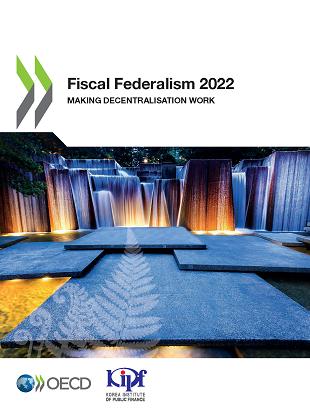




The OECD Network on Fiscal Relations
• Is the premier international body devoted to improving fiscal relations across levels of government
• Follows a work plan set by member countries to meet their needs
• Helps members answer practical questions about fiscal decentralisation by undertaking cross-country policy analysis
The Network benefits its members by:
• Sharing best practices
• Providing international comparisons
• Coordinating the annual high-level meeting in Paris

DID YOU KNOW?
Sub-central governments represent: 32% of public spending, 15% of tax revenue, and 65% of public investment across the OECD. WHY BECOME A NETWORK MEMBER?
• Maintaining a comprehensive decentralisation database
• Undertaking cross-country studies
• Publishing the flagship Fiscal Federalism series
» Help set the Network’s research direction and work plan
» Learn about best practices from senior officials working on fiscal decentralisation
» Be the first to obtain early results of analytical studies
» Receive useful data on other countries’ successful approaches to fiscal relations, conveniently presented in accessible formats
» Have a contact point for support to improve fiscal relations
The Network’s next annual meeting will take place on: 25-26 April 2024 at the OECD Headquarters, Paris

Current analysis being undertaken for Network members includes:
• Boosting the performance of subnational public services: evaluating benchmarking systems for subnational public sector performance.
• Technology, digitalisation and fiscal decentralisation: how will technological change affect fiscal decentralisation? What are the institutional and regulatory implications?
• Addressing subnational financial comparability challenges: how can fiscal frameworks and accounting rule consistency support better monitoring, and underpin financial sustainability?
The Network also maintains the decentralisation database, covering all facets of fiscal relations.
The database includes indicators on:
• Revenue and pending decentralisation
• Intergovernmental grant composition
• Tax and spending autonomy
•Subnational fiscal rules
•Subnational deficits and debt
Subnational governments’ control over revenue sources (% of total revenues)
UNITARY COUNTRIES FEDERAL COUNTRIES
Discretion on tax rate and relief
Discretion on tax rate
Discretion on tax rate and relief
Taxsharingarrangementswith centralgovernment
Discretion on tax rate and relief
Discretion on tax rate and relief
Discretion on tax rate and relief
Discretion on tax rate
Tax rate and relief set by central government
Taxrateandreliefsetbycentralgovernment
Discretion on tax rate
Discretion on tax rate
Discretion on tax rate
Taxsharingarrangementswith centralgovernment
Taxsharingarrangementswith centralgovernment
Taxrateandreliefsetbycentralgovernment
Taxsharingarrangementswith centralgovernment
Tax sharing arrangements with central government
Other
Taxrateandreliefsetbycentralgovernment
Taxrateandreliefsetbycentralgovernment
Other
Other
The Network’s flagship synthesises its work on how to balance the policy trade-offs inherent in intergovernmental fiscal relations, making use of novel analytical results.
